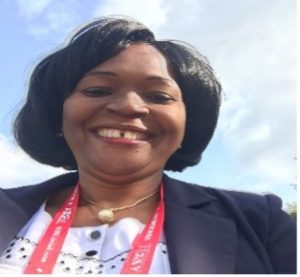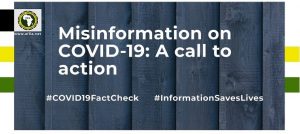By Chinwe V. Anunobi
AFLIA, the voice of African library sector has focused on deepening the professional competencies of African librarians and awakening them to be in the forefront of driving literacy, information equity and openness in the continent. The organization has also been building the capabilities of librarians which will enable them to search out and implement innovative solutions that will drive development in their various communities. The pandemic period with its associated work-from-home provided a window for the very mobile professionals to participate in some of the competency’s enhancement webinars organised by AFLIA for librarians in African. One of these continuing professional development efforts which is yielding dividend for community of information users, librarians and the general public is Misinformation on COVID 19: Call to Action.
AfLIA believes that as managers of information, African librarians cannot afford to stay on the side lines and act unconcerned while fakenews about COVID19 continues to spread. This is the time for librarians to play their part by disseminating correct, reliable, relevant information that will make Africans concerned without instigating panic and bursting myths and disinformation that can help the pandemic wax strong in the continent. Hence Misinformation on COVID-19 : Call to Action was put forward. Consequently, AFLIA took a bold step to organize a 5day training for African librarians with a view to centrally position African Librarians to address the menace of misinformation.
During the 2020 Global Media and Literacy Week (24th – 31st October) which has the theme – “Resisting Disinfodemic: Media and Information Literacy for everyone and, by everyone” AFLIA organised a 5day training – 2020 Media and Information Literacy Week: Call to Action which was focused on exploring the main strands of disinfodemic and provide the opportunity for African librarians to propound ideas and pathways for dealing with it in different African communities. The short training aimed to:
- Create awareness about the 2020 Global and Media Literacy Week;
- Expose librarians to the realities of the 21st-century information provision environment especially infodemic, disinformation and disinfodemic; and
- Lead African Librarians into drawing up implementable Action Plans for dealing with disinfodemic.
The training exposed the Librarians to the concepts of Media and Information Literacy, Infodemic, Misinformation, Disinformation or Weaponized Misinformation and Disinfodemic.
Media and Information Literacy (MIL)
This has been acknowledged as a means for achieving development. Realities of the 21st century make it imperative that everyone is empowered with MIL skills in order to holistically engage with information and opportunities fully offline and online safely and gainfully. The Global Media and Literacy Week was iinitiated in 2012 by UNESCO (United Nations Educational, Scientific and Cultural Organization) in cooperation with; GAPMIL (Global Alliance for Partnerships on Media and Information Literacy), UNAOC (United Nations Alliance for Civilizations)MILID (MIL and Intercultural Dialogue) University Network ; the Week is an avenue for uniting the different organizations that promote Media and Information Literacy(MIL) all over the world so that everyone will join hands to uphold MIL as a veritable pathway for engendering social inclusion and intercultural dialogue.
Media and information literacy skills are intersecting competencies that are necessary for searching, accessing, evaluating and verifying information as well as for safely using and creating information for offline and online platforms. The MIL suite of skills enables one to ask pertinent questions and answers about the information and/or media one wants to engage with including :
- Who created this? Is it obvious, is it as stated or is it hidden? Can you tell if the website is authentic?
- Why was it created? To state facts? To share news? Or an opinion? Or fiction? Speculative reporting? Advertisements and/or sponsored write-up? For malevolent reasons? Is it satire or comedy? Is it biased? What is informing your decision?
- Are the headlines different from the body of the information? Or the headlines slightly represent what is in the body of the information? Is the media doctored in any way? Is the labeling right?
- Who do you think the information was meant for? Is it clear? Why do you think so?
- What makes you think the information is true? Cross-checkable statistics and links? Authoritative information? Why do you think so?
- Are there holes in the information, details that you feel should be there? How do you know?
- Does it sound too good to be true? Why?
- Is it safe to share?
- Is it safe to share personal details on the site?
As teaching, learning and most engagements migrate to online spaces due to the COVID-19 crisis, these skills have become more important than ever to enable people function effectively as they interact with information in online spaces. Media & Information Literacy (MIL) provides answers to the questions that we all ask ourselves at some point. How can we access, search, critically assess, use and contribute content wisely, both online and offline? What are our rights online and offline? What are the ethical issues surrounding the access and use of information? How can we engage with media and ICTs to promote equality, intercultural and interreligious dialogue, peace, freedom of expression and access to information?
Media and Information Literacy (MIL) brings together the three distinct dimensions of Information Literacy, Media Literacy, and ICT or Digital Literacy . it is “a new literacy construct that helps empower people, communities and nations to participate in and contribute to global knowledge societies”
Even though different terminologies are used in MIL, such as digital media literacy, information literacy, visual literacy, Internet literacy or news literacy, in general, the definitions refer to “competencies that emphasize the development of enquiry-based skills and the ability to engage meaningfully with media and information channels in whatever form and technologies they are using”
MIL encompasses “the full range of cognitive, emotional, and social competencies that include the use of text, tools and technologies; the skills of critical thinking and analysis; the practice of messaging composition and creativity; the ability to engage in reflection and ethical thinking; as well as active participation through teamwork and collaboration” (Hobbs, 2010). It “relates to the ability to access the media, to understand and critically evaluate different aspects of the media and media content and to create communications in a variety of contexts” It is essentially “a matter of education, of citizenship education, of the necessary ‘literacy’ that allows individuals to truly participate in society. We need strong education policies that include at its core MIL education” (Torrent, 2014), since all citizens, with no exception, “should have access to multi-literacy skills education – including media and information literacy – which is effective, up-to-date and free of charge or affordable for the most financially disadvantaged members of society. It is a way of guiding people against misinformation. MIL aims to enable individuals to think critically about the media and the information they consume by engaging in a process of inquiry. The aim, according to UNESCO’s definition of media and information literacy, is to allow individuals to become engaged citizens and responsible decision-makers.
Infodemic
When an excessively overwhelming amount or overabundance of information is generated online and offline about a particular concept enough to cause confusion it is termed an infodemic. The enormous amount of information online and offline on COVID-19 has great potential of creating confusion and disempowering people instead of equipping them to make the right decisions. The COVID-19 generated infodemic has led to wrong choices and hazardous use of drugs in preventing and attempting to cure the virus.
Misinformation
This applies when wrong information is unintentionally created and spread. This includes but is not limited to wrong translations, satire or parody wrongly understood as real stories/news, mislabelling of pictures and quoting wrong dates in a write up.
Disinformation
This is the deliberate spread of false information knowingly or weaponized misinformation camouflaged as facts such as the intentional hyping of a drug as cure for COVID-19, manipulation of audio-visual content and Artificial Intelligence generated synthetic texts among others.
Disinfodemic
A more dangerous scenario which involves steady and heavy deluge of misinformation and disinformation spread deliberately to mask/obstruct the truth, to cause harm to individuals, entities or to push out alternative fact(s) in order to uphold or support harmful agenda. Disinfodemic especially as pertains to COVID-19 seeks to invalidate science, escalate polarization by all means and works by tapping into or appealing to:
- what we believe in rather than scientific reasoning for example anti-vaccination campaigns;
- our feelings instead of critical and deductive reasoning; and
- biases/prejudices.
Four main formats employed in spreading disinfodemic are –
- Mixing lies, personal opinions and incomplete information in strong emotional language. factcheck.org, hoax-slayer.com, snopes.com etc are used to crosscheck texts to ascertain if true or not. However, this site is an amalgamation of different websites that check fake news (fact checkers) about COVID-19 – https://www.poynter.org/coronavirusfactsalliance/
- False websites and identities used to circulate seemingly true news
- Fraudulently manipulating media in order to plant fear, polarization and other negative agenda for example – https://tellmamauk.org/no-the-muslims-praying-in-this-video-arent-ignoring-the-coronavirus-lockdown-its-far-right-fake-news/ Many librarians who understand the importance of checking media, especially images use https://images.google.com
- Intentional efficiently organized campaigns meant to sow confusion and discord, spuriously collect personal data and/or get money from false claims of quack cures.
Many pathways for responses to disinfodemic have been outlined by UNESCO.
These are grouped under four groups –
- “Monitoring, fact-checking, and investigative responses aimed at identifying, debunking, and exposing COVID-19 disinformation
- Governance-based responses, which include law and policy, and state-based counter-disinfodemic responses
- Curation, technological, and economic responses, which pertain to the policies and practices of institutions mediating content
- Normative and ethical; educational; empowerment and credibility labelling responses – all of which are aimed at the audiences targeted by disinformation agents, with citizens and journalists being a particular focus.” (UNESCO, 2020).
Participants at the training were required to:
- Provide examples of how as an African librarian using their professional skills, plans to support this UN resolution on infodemic, misinformation and disinformation:
- In their workplace;
- Generally, in their country; and
- In online spaces.
- Prepare and present action plan to address menace of disinfodemic from which the best ten were chosen for implementation .
At the end of the training , participants were fully empowered to use social media , print and other electronic media collaboratively to address the menace of misinformation, disinformation, infodemic and disinfodemic .


What an insightful blog on this issue! I wish i could get what the participants suggested in terms of how the African librarian using their professional skills can help in assisting UN on Infodemic, Disinfomration, Misinformation Disinfodemic.
This is great stuff! Thanks
This is a good article. Thank you for the insight.
Thanks Ma
Thank you Dr. for this educative piece. I was one of the participants and it was an interesting experience. It was a training packed with the necessary skills and required knowledge on MIL.